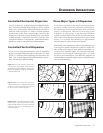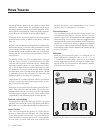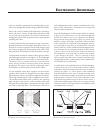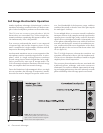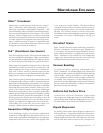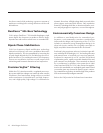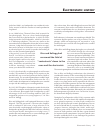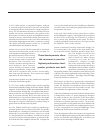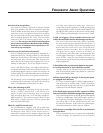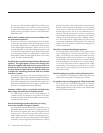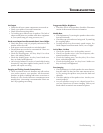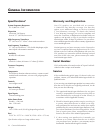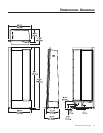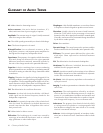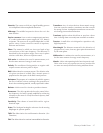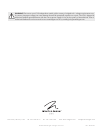
Frequently Asked Questions 21
frequently asked questIons
How do I clean my speakers?
Use a dust free cloth or a soft brush to remove the dust
from your speakers. We also recommend a specialty
cloth (available at the Xtatic shop at www.martinlogan.
com) that cleans your speakers better than anything
else we have tried. For the wood surfaces it is accept-
able to slightly dampen the cloth. The EcoSound
material on the CLX requires special care—see the
next FAQ. Do not spray any kind of cleaning agent
on or in close proximity to the electrostatic element.
Avoid the use of ammonia based products or sili-
cone oil on any wood parts.
How do I care for the EcoSound material?
Your CLX loudspeaker was packaged for shipment in a
protective fabric bag. The bag is made of a soft material
which may absorb some of the natural oil used to finish
the EcoSound. After removing the fabric bag you may
notice that the EcoSound surface appears un-even or
blotchy in some places. This is very simple to correct.
Using a soft, lint-free cloth, you simply hand rub furni-
ture grade finishing oil onto the EcoSound surface. We
recommend natural orange or lemon fine furniture oil
for best results. This easily repeatable process will always
return your EcoSound to its original uniform luster.
We encourage you to occasionally reapply finishing oil
to maintain the EcoSound’s rich dark color and keep
your CLX loudspeakers looking their very best.
What is the advantage of ESL?
Since the diaphragm is uniformly driven over its entire
surface—unlike a tweeter that is only driven at its
edges—it is the only technology that can be made
large enough to play bass, yet is still light enough for
high frequencies. This unique property allows for the
elimination of high frequency crossover points and
their associated distortions.
What size amplifier should I use?
We recommend an amplifier with 100 to 200 watts
per channel for most applications. Probably less would
be adequate when used in home theater where a
subwoofer is employed. Our designs will perform well
with either a tube or transistorized amplifier, and will
reveal the sonic character of either type. However, it
is important that the amplifier be stable operating into
varying impedance loads: an ideally stable amplifier will
typically be able to deliver nearly twice its rated wattage
into 4 Ohms and should again increase into 2 Ohms.
Could you suggest a list of suitable electronics and
cables that would be ideal for MartinLogan speakers?
The area of electronics and cable choice is probably
the most common type of question that we receive. It
is also the most subjective. We have repeatedly found
that brands that work well in one setup will drive
someone else nuts in another. We use many brands
with great success. Again, we have no favorites; we
use electronics and cables quite interchangeably. We
would suggest listening to a number of brands—and
above all else— trust your ears. Dealers are always the
best source for information when purchasing additional
audio equipment.
Is there likely to be any interaction between my speak-
ers and the television in my Audio/Video system?
Actually, there is less interaction between a television
and an electrostatic speaker than between a television
and a conventional system.
Will my electric bill go ‘sky high’ by leaving my speak-
ers plugged in all the time?
No. A pair of MartinLogan’s will draw approximately 1
watt maximum (in standby mode). There is circuitry to
turn off the static charge when not in use, to prevent dust
collection on the electrostatic element.
If the diaphragm is punctured with a pencil or similar
item, how extensive would the damage to the speaker be?
Our research department has literally punctured hundreds
of holes in a diaphragm, neither affecting the quality of
the sound nor causing the diaphragm to rip. However,
you will be able to see the actual puncture and it can
be a physical nuisance. If this is the case, replacing the
electrostatic transducer will be the only solution.
Will exposure to sunlight affect the life or performance
of my speakers?
We recommend that you not place any loudspeaker
in direct sunlight. The ultraviolet (UV) rays from the



